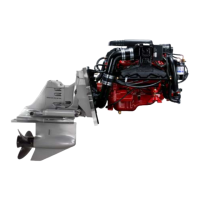
Do you have a question about the Volvo Penta 5.7GXi-F and is the answer not in the manual?
| Brand | Volvo Penta |
|---|---|
| Model | 5.7GXi-F |
| Category | Engine |
| Language | English |
Company values highlighting quality, safety, and environmental responsibility.
Explains safety alert symbols for dangers, warnings, and cautions.
Summarizes risks and precautions for maintenance and service activities.
Details safe handling procedures for lifting the engine.
Covers hazards related to fuel, lubricants, and electrical systems.
Information on the risks of carbon monoxide poisoning.
Safety guidelines for handling hazardous chemicals used with the engine.
Safety precautions when working with the cooling system.
Basic safety measures for operating the boat and engine.
How to use the emergency stop switch for safety.
Provides essential safety checklists for trips and equipment.
Guidance for planning a safe and enjoyable boat trip.
Essential rules and recommendations for safe boating practices.
Guidelines for safely operating high-performance boats.
Volvo Penta's commitment to environmental care in product development and use.
Guidelines for breaking in the engine for optimal life and performance.
Requirements for engines certified for exhaust emissions regulations.
Details standards for quoting engine power output and influencing factors.
Explains how boat weight affects performance and speed.
Explains the limited warranty and requirements for coverage.
Information on the 24/7 breakdown assistance service.
Graphical representations and typical locations of engine decals.
Guidance on locating and recording engine and drive unit serial numbers.
Importance of the owner's card for warranty validation.
Information about the network of authorized Volvo Penta dealers.
Overview of common instrument panel components like tachometer and gauges.
Explains how audible alarms function for engine status and malfunctions.
How to use the emergency stop switch for safety.
Guidance on regularly checking instruments for abnormal readings.
Normal operating temperature ranges for the engine.
Describes how the engine limits operation during certain fault conditions.
Explains the function of the ECM in controlling engine operations.
How ECMs are linked in dual engine installations.
Explains the function and benefits of the power trim/tilt system.
Overview of instruments indicating the current trim position of the drive unit.
Details the three main ranges of the analog trim instrument.
Explains the digital display for drive unit angle and operational ranges.
Describes the meaning of LEDs on the digital trim instrument.
Precautions to prevent overheating of the trim/tilt motor.
Explains the impact protection system for the drive unit.
Explains the operation of the single-lever remote control unit.
How to disengage the gear shift for speed control only.
Procedures for maneuvering boats with twin engines.
Procedures for shifting gears and controlling speed with the remote.
Correct procedure for shifting between forward and reverse gears.
Recommends optimal cruising speeds for economy and engine life.
How to adjust the friction brake for lever action on remote controls.
Adjustment procedure for side mount remote controls.
Explains how to raise and lower the drive unit for optimal boat performance.
Operation of the trim control panel buttons.
Operation of single control levers with catch buttons for drive trim.
Operation of dual control levers with catch buttons for drive trim adjustment.
Step-by-step guide for starting and operating the marine engine.
Essential checks and precautions before starting the engine.
Procedures for starting a cold engine, including priming.
Steps to take if the engine becomes flooded.
Procedure for starting a warm engine.
Correct procedure for shutting down the engine safely.
Instructions for using remote control systems with throttle lock.
How to operate the boat's steering system.
Considerations for steering boats with twin engines.
Guidelines for using the power trim for optimal boat performance.
How to find the optimal trim angle for best boat performance.
Recommended uses and considerations for the bow-up trim position.
Recommended uses and considerations for the bow-down trim position.
Procedures for using the power tilt feature for clearance.
Locating the trim/tilt controls and indicators.
Procedures for various challenging boating conditions.
Precautions for operating the boat in shallow water.
Recommendations for using the sterndrive in salt water.
Important checks and procedures before trailering the boat.
Identifies circuit breakers and fuses for the engine and related systems.
Explanation of symbols used in engine diagrams.
Diagram and list of components for the 3.0GLP-C engine.
Diagram and list of components for 4.3GL-D and 5.0GL-E engines.
Diagram and list of components for specific GXi/Gi engine models.
Diagram and list of components for 8.1Gi/GXi engine models.
Diagram and list of components for the SX-M sterndrive.
Diagram and list of components for the DP-S sterndrive.
Guidelines for breaking in the engine for optimal life and performance.
Importance and procedures for the initial 20-hour service inspection.
A table outlining required maintenance tasks by frequency.
How to perform a static water line test to prevent engine damage.
Checklist for preparing the boat before launching.
Procedures for preparing the equipment for storage.
General guidance on maintaining various boat systems.
Procedures for inspecting and maintaining the engine exhaust system.
Details about fuel type, filters, and system maintenance.
Information on using gasoline blended with alcohol additives.
Explains detonation and how to address it.
Information on the EFI system and its lack of periodic maintenance needs.
Instructions for cleaning and inspecting the flame arrestor.
Details on checking and maintaining electric fuel pumps.
Specific requirements for Volvo Penta EFI engine fuel filters.
Step-by-step guide for replacing the engine fuel filter.
Overview of the engine's electrical system components and wiring.
Guidance on battery installation and connection safety.
Steps and safety guidelines for replacing the boat battery.
How circuit breakers and fuses protect the electrical system.
Information on spark plug types, gaps, and proper installation.
Step-by-step guide for inspecting and replacing spark plugs.
Procedures for checking and adjusting serpentine and V-belts.
Details on engines using V-belts and their maintenance requirements.
How to check and adjust the alternator belt tension.
Overview of raw water and closed cooling systems.
Specific overheating warnings for Gi & GXi engines.
Instructions for flushing the engine with fresh water.
Procedures for draining the cooling system to prevent freezing damage.
How to inspect and replace the water pump impeller.
Checks for wear and leaks in steering system cables and hoses.
How to check and maintain the power steering fluid level.
How to check and maintain the fluid level in the trim/tilt assembly.
Engine oil type, viscosity, and change recommendations.
Step-by-step guide for replacing the engine oil filter.
How to check and lubricate the drive unit.
Procedures for draining the drive unit lubricant.
Procedures for filling the drive unit with lubricant.
Information on sacrificial anodes for corrosion protection.
Procedure for replacing anodes in the heat exchanger.
Description of the APC system for sterndrive corrosion protection.
Procedures for preparing and painting sterndrive units.
Step-by-step guide for removing and installing SX sterndrive propellers.
Instructions for replacing DP-S sterndrive propellers.
Importance and procedure for engine alignment.
Immediate actions required if the engine is submerged.
Guidelines on using genuine Volvo Penta parts and avoiding substitutions.
A guide to help isolate malfunctions by system.
A comprehensive list of engine-specific troubleshooting topics.
Checks for issues when the engine fails to crank.
Troubleshooting steps when the engine cranks but doesn't start.
Troubleshooting steps for engines that are difficult to start when cold.
Troubleshooting steps for engines that are difficult to start when hot.
Diagnostic checks for engines running roughly at different speeds.
Identifying causes of unusual engine noises and vibrations.
Steps to diagnose and resolve engine overheating issues.
Checks for issues causing the engine to stop unexpectedly.
Troubleshooting steps for engines not reaching maximum RPM.
Diagnosing problems related to the engine's lubrication system.
Steps to diagnose and resolve low battery voltage after storage.
Detailed technical specifications for the 3.0GLP-C engine.
Detailed technical specifications for the 4.3GL-D engine.
Detailed technical specifications for 4.3GXi-E and 4.3GXi-EF engines.
Detailed technical specifications for the 5.0GL-E engine.
Detailed technical specifications for 5.0GXi-E and 5.0GXi-EF engines.
Detailed technical specifications for 5.7Gi/GXi engine models.











